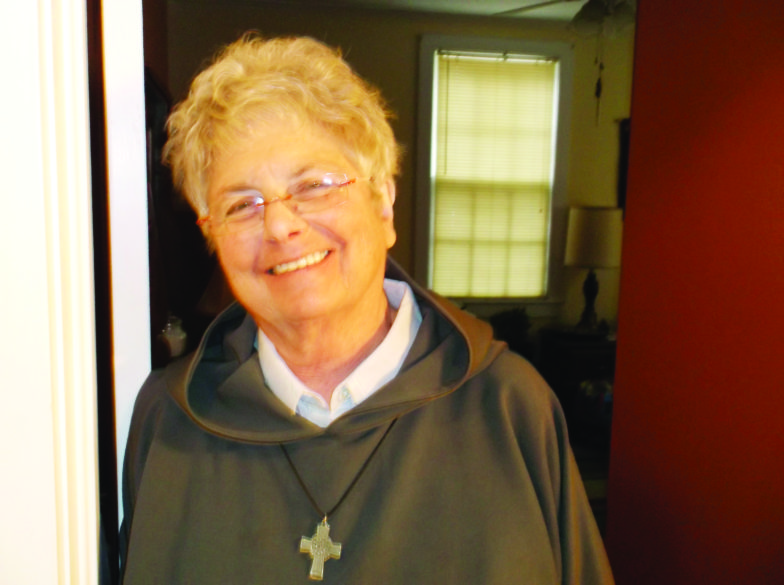From the Hermitage
By sister alies therese
In Madeleine L’Engle’s marvelous Wrinkle in Time, Meg learns what to long for in darkness and foreboding. When she discovered Mrs. Whatsit loved her, Meg could use it. Only hatred and deception filled It, yet by love, Meg would make all things well again, despite her fears. The more she insisted she loved her brother Charles Wallace, the more he was freed from It’s powerful falsehoods to become himself again; freedom reigned, and they escaped. I wonder if Julian saw something like this in her shewings, her wrinkle in time; the passion being full of hatred and darkness yet ultimately exposing great love?
“In a world that is in danger of losing sight of the fact that ‘all shall be well,’ Julian’s soteriology has something to contribute to hope…unity between all things: God, creation and humanity…it generates hope that our present experience of divine love will come to eschatological fruition for all creation, all things, in the fulness of God’s time.” (Gifted Origins to Graced Fulfillment: The Soteriology of Julian of Norwich, Kerrie Hide)
Consider some similarities: Julian (1342-1416) was surrounded by plague…the Black Death killed over 55,000 in Norfolk when she was six. The Hundreds’ Year war, peasant revolts, the troubled reign of Richard II, prosecution of heresy, and the Great Schism splitting the Latin and Eastern rites were among top news items. Today’s issues are sadly familiar. Many languish looking for hope, wondering what to desire.
To discover the hope and joy that Julian will finally tell us about, this ‘all shall be well,’ invites us into the search to discover the demon of deception who tries to overcome God’s kindness. We find Julian disclosing her encounters with Jesus in her book.

What did the revelations on May 8, 1373, unveil? God’s love for all He had created. The first fifteen came three days after pain left her during a near-death experience; the sixteenth came after a gap where she was confronted by the devil in frightening darkness. God’s love keeps and sustains all and though there is sin, God looks on all God has made with pity, does not blame, and assures us that ‘all will be well.’
Julian was in her 30’s when she picked up her cat, moved with her maid, and set off to pray in an anchorhold, rooms attached to the church. The local Bishop sealed her in with a liturgy of the dead and consecration, and she never left, speaking only to her maid, the priest and those who came to her window for consolation facing the busy streets of Norwich, then England’s second-largest city.
“Concerning my third petition, I conceived a very great desire to receive three wounds: the wound of true contrition, the wound of natural compassion, and the wound of fullhearted longing for God.” (Revelations of Divine Love, Intro)
God answered her plea.
What do I ardently long for? Julian’s three gifts are stark in our world of opposites. The wounds are central to her life, and she says: “…in grief and sorrow, I said this to my Lord, in fear and trembling: ‘Oh good Lord, how can all be well when great harm has come to your creatures through sin?’” (chapter 29)
In chapter 31, the good Lord answered with this: “I am able to make all things well, and I shall make all things well. And you will see for yourself that all manner of thing shall be well.”
Consider this: “Find delight in the Lord, who will give you your heart’s desires.” (Psalms 37:4) Jesus will quote from this psalm when teaching the beatitudes: “But the meek shall inherit the earth; and will delight in great prosperity.” (37:11) These ‘meek’ are those ‘overwhelmed by want,’ the anawim, and ‘denotes those who are aware of their dependence upon God.’ (New Jerome Biblical Commentary, 532). Those deceived are sure they are in control. Julian, however, like these anawim, banked on Jesus whose: “Hidden dynamism was at work by which all manner of thing would be well. This ‘secret,’ this act which the Lord keeps hidden is the full fruit of the Parousia. It is not just that ‘Jesus comes,’ but Jesus comes to reveal with God’s final answer to all the world’s anguish…the ‘great deed’ the Lord will do on that day, not of destruction and revenge, but of mercy and life…all will be made right in spite of all its sorrow. The ‘wise heart’ remains in hope and contradiction…fixed on the secret.” (Conjectures of a Guilty Bystander, Thomas Merton)
Finally, Julian wants to reveal this love, this joy, this ‘secret’ Merton speaks of. In chapter 14 she shares: “I saw in my imagination heaven, and our Lord as the head of the house, who had invited all dear servants and friends to a great feast. The Lord occupied no one place in particular in the house, but presided regally over it all, suffusing it with joy and cheer. Utterly at home, and with perfect courtesy, Jesus was the eternal happiness and comfort of friends, the marvelous music of unending love showing in the beauty of His blessed face full of joy and delight.”
(Sister alies therese is a canonically vowed hermit with days formed around prayer and writing.)
